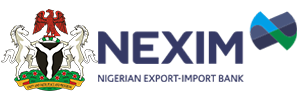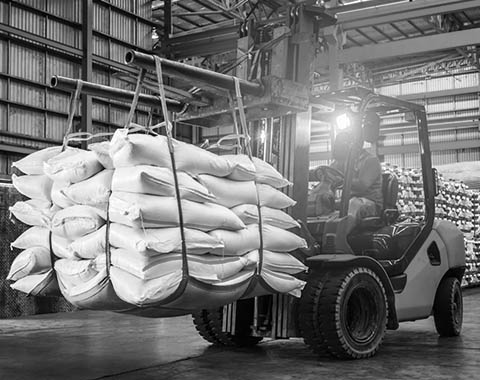
The Export Development Facility (EDF) is being introduced by the Nigerian Export- Import Bank (NEXIM) arising from the Central Bank of Nigeria’s (CBN) investment in a N50billion Debenture issued by NEXIM to stimulate and increase deliberate funding, especially to Small and Medium Enterprises (SMEs) towards facilitating regional industrialization for value added exports and broadening Nigeria’s export basket and market destinations.
The Facility will be used to support export oriented enterprises in the non-oil exports value-chain.
Objectives of the Facility:
A bank seeking to benefit from the facility shall be of good financial health as evidenced by its audited accounts for the preceding three years, current market information, and meet criteria set by NEXIM from time to time.
Exporters
- Be duly incorporated/registered in Nigeria as limited liability companies or cooperative societies (manufacturing, trading or service companies).
- it produces goods/services for direct export.
- it uses at least 60 per cent (by value) of local raw materials or intermediate goods/services produced in Nigeria for its products, or the local value added of its products exceeds 50 per cent
Collateral Requirements
All PB’s are expected to fully secure their lending. The types of security acceptable to NEXIM shall include but not limited to the following:
- a) Improve access of exporters to concessionary finance to expand and diversify the non-oil export baskets;
- b) Attract new investments and encourage re-investments in value-added non-oil exports production and also promote non-traditional exports;
- c) Revamping / Resuscitating export-oriented industries to create / sustain more jobs within the non-oil exports sector in Nigeria;
- d) Support the Bank’s beneficiary clients to upscale operational capacities and upgrade production systems to enhance competitiveness as well as expand their export operations and capabilities;
- e) Diversify and increase the level of contribution of non-oil export revenue and value-added exports for sustainable economic development; and
- f) Broaden the scope of export financing instruments and to complement other non-oil export financing schemes.
Eligibility Criteria
Only export-oriented enterprises shall be eligible under the EDF. Such shall also be:
- Duly registered/incorporated in Nigeria.
- Commercially viable and have relationship with established counterparties and contracts with verifiable export off-takers.
- With satisfactory credit reports obtained from at least two (2) Credit Bureau (in line with the provisions of the CBN Circular BSD/DIR/GEN/CIR/04/014 dated April 30, 2010).
- Projects in sectors that impact women and youth employment / projects with deliberate focus on women / youth empowerment programmes in the export value chain.
- Projects with regional export promotion/ export development objectives and / or promoted by States as a private sector export enterprise.
Eligible Transactions
Eligible transactions to qualify for funding under the EDF shall include:
- Transactions connected with export of goods wholly or partly processed / manufactured in Nigeria;
- Transactions relating to export of commodities and services, which are exportable under the laws of Nigeria;
- Transactions of specific projects, established for the production / supply of inputs towards the purpose of manufacturing / packaging for exports;
- Transactions of value added production supported by States/Regions and promoted by Private Sector Companies.
Eligible Transactions under the Fund
The following shall be eligible for support under the EDF:
- a) resuscitation, modernization and technology upgrade / acquisition of non-oil exports industries;
- b) Anchor Borrower - Type arrangement for exports in collaboration with Co-operative societies and other community-based support arrangements.
Obligor Limit
The Facility shall not be more than 60 percent of the total cost of the project or transaction, subject to a maximum of the Bank’s single obligor limit
Tenor
a) The EDF shall have a maximum tenor of up to 9 years.
b) Working capital input supply financing under an Anchor Borrowers’ arrangement shall be for a maximum tenor of one year with the option of roll-over not exceeding twice on transactions, with transaction to be supported with a medium term contract arrangements with credible counter parties acceptable to the Bank.
Repayment
Repayments of principal components of the loan under this facility shall be in semi-annual installments after the moratorium period, not exceeding 2 years.
Moratorium
a. The EDF allows for moratorium on principal repayment. This shall however be project specific and not exceed two (2) years during the implementation or construction phase of the project.
b. Additional moratorium period of twelve [12] months may be added to the initial moratorium period in the event of completion delays at a negotiable restructuring fee, subject to a maximum of 0.25% flat rate.
Interest Rate / Margins
The Facility shall be availed at a maximum all-in interest rate of 9% per annum inclusive of all charges. However, legal charges are to the account of beneficiary projects.Interest During Project Implementation / Construction
Interest charges during implementation – construction / resuscitation phase of projects shall be dependent on the status and structure of the project.
They shall be categorized as follows:
- a) Capitalization of Interest - interest accruable for capitalization during the moratorium period.
- b) Pre-funding of Interest - interest payable during implementation / construction from a pre-funded Project Implementation / Debt Service Account. The amount or interest payable shall be added to the total project cost.
Basic Documentation Requirement
Each request for a facility must be accompanied by the following documents:
- a) Application Form
- b) Request from the project promoter seeking funding under the EDF.
- c) Certificate of Business Incorporation.
- d) Audited Statement of Accounts for the last three (3) years.
- e) Management Account for existing Companies and Statement of Affairs for Start-ups (where applicable);
- f) Feasibility Study / Business Plan of the project;
- g) Relevant Permits / Licenses / Approvals (where applicable) ;
- h) Verifiable Export Orders / Contracts or other Export Agreement & Arrangements/Commitments.
- i) Environmental Impact Assessment (EIA) Report (where applicable);
- j) Copies of executed warehouse arrangements with acceptable collateral managers for structured trade transaction.
- k) Any other document(s) that may be required by NEXIM
Approved applications shall be required to provide adequate collateral to cover the exposure in the fixed asset coverage ratio of not less than 150% of loan value.
However, where collateral inadequacy could hinder loan sanctioning to approved applicant that would result in loss of non-oil exports opportunity, failure to honor the sanctity of executed export contracts and/or execution of new confirmed export orders by export-oriented enterprises, additional risk bearing instruments to minimize risks of lending could be mutually explored with the approved applicant. In this regard, the following may be considered;
- a) Nigeria Incentive Based Risk Sharing System for Agricultural Lending (NIRSAL) Credit Risk Guarantee Instrument for agricultural value chain tied to export contracts.
- b) Administration of a structured trade finance framework against acceptable guarantees or performance bonds issued by / or on behalf of highly rated collateral managers and warehouse operators approved by the Bank. c) An acceptable Credit Guarantee Instrument.
All funded projects shall be subject to both on- and off-site monitoring by NEXIM from time to time during the duration of loan. Loans availed under NIRSAL Guarantee shall also be subject to monitoring by NIRSAL Plc.
I. Amount of Forex Generated / Repatriated.
II. Volume Processed or Sourced / Exported
III. Employment Generated / Sustained
IV. Capacity Utilization / Trade Volumes – Before / After Funding Support under EDF

